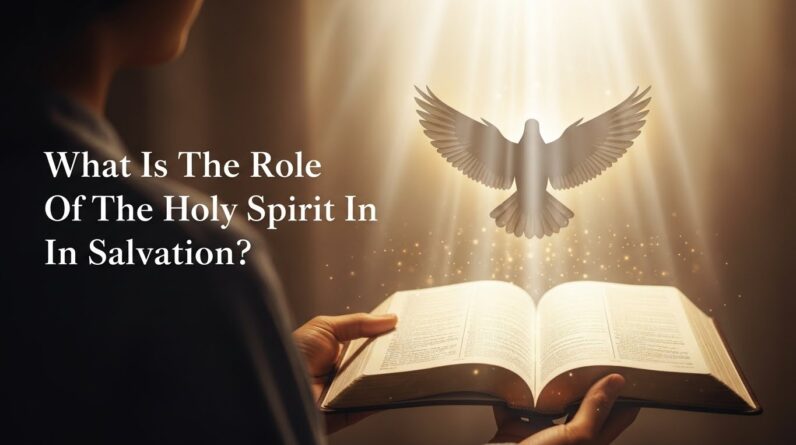What Is Salvation In The Bible? (Ephesians 2:8-9, John 3:16)

Introduction
Have you ever wondered what “salvation” really means in the Bible — not just as a church word, but for your everyday life? Maybe you’ve heard it in songs, read it in a verse, or felt its tug during hard seasons. Salvation isn’t an abstract idea reserved for theology books; it’s the heart of the gospel and affects how you live, hope, and relate to God and others. In this article, you’ll explore what the Bible says about salvation using two key passages: Ephesians 2:8-9 and John 3:16. You’ll see how salvation is both a gift and a life-changing reality you can experience now.
📖 The Bible Foundation
Here are the two central verses we’ll unpack. Read them slowly and let their words sink in.
Ephesians 2:8-9 (NIV): Ephesians 2:8-9 — “For it is by grace you have been saved, through faith—and this is not from yourselves, it is the gift of God—not by works, so that no one can boast.”
John 3:16 (NIV): John 3:16 — “For God so loved the world that he gave his one and only Son, that whoever believes in him shall not perish but have eternal life.”

When you read these verses together, two big ideas jump out: God’s initiative and your response. Ephesians tells you salvation is a gift of grace, not something you earn. John 3:16 shows the depth of God’s love displayed in Christ’s giving. Contextually, Ephesians comes from Paul’s letter to a church learning what unity and grace mean; John records Jesus’ conversation with Nicodemus, explaining spiritual rebirth. Both passages point to a rescue that starts with God and invites your trust.
🧠 Understanding the Core Truth
In plain terms, salvation in the Bible means being rescued from the consequences of sin and brought into a restored relationship with God. That rescue is accomplished by Jesus — his life, death, and resurrection — and is received by you through faith. Ephesians emphasizes that this rescue is unearned grace; John 3:16 highlights God’s loving motivation and the promise of eternal life.
This core truth matters because it frames your identity. When you accept this gift, you’re no longer defined by failure, fear, or separation from God. Instead, you’re defined by God’s grace and the hope of a new life, both now and forever. This reshapes your priorities, how you handle suffering, and how you relate to others.

🌊 Going Deeper — The Hidden Meaning
Beneath the straightforward statements of Ephesians and John is a deeper heart-level truth: salvation changes your story. It’s not just a legal transaction; it’s a transformative relationship. Ephesians’ language about grace and gift challenges pride — you can’t climb to God by your own ladder. John’s phrase “whoever believes” invites radical inclusion: the offer is broad and personal.
Think of Zacchaeus in Luke 19 — a short tax collector despised by his community. When Jesus invited himself to Zacchaeus’ house, a transformation followed: Zacchaeus repented, promised restitution, and experienced restoration. Salvation often follows a similar pattern: an encounter with Jesus, a recognition of need, and a turning that results in both inward change and outward fruit. The hidden meaning is that salvation is dynamic: it roots out sin’s power and begins ongoing restoration.
💡 Modern Connection — Relevance Today
So how does this ancient truth apply to you in a noisy, busy world? Salvation answers modern anxieties about worth, success, and fear of failure. When you understand salvation as a gift, you stop measuring your value by achievements and start receiving identity from God’s love. At work, that frees you from performance-based worth; in relationships, it gives you space to forgive and ask forgiveness; in seasons of doubt, it reminds you that your acceptance by God isn’t conditional.
Also, the grace-centered nature of salvation pushes back against toxic religiosity that uses faith as a checklist. Instead, you’re invited into a living relationship with God through Jesus — one that transforms your motives and choices. That changes how you parent, lead, or rest.
❤️ Practical Application — Living the Message

Knowing salvation is a gift changes what you do daily. You don’t earn love; you live out gratitude. Start small: thank God in prayer for the gift of salvation every morning, choose one relational act that reflects grace (forgive someone, offer help), and open your Bible regularly to hear what God says to you as a child of God. Practically, practice these steps: confess honestly, accept God’s forgiveness, and seek to show Christlike love to others.
Join a local Bible study or a discipleship group so your faith doesn’t stay private. Serving others — not to earn favor, but because you’re grateful — is a powerful way to live your salvation. These are not performance metrics; they’re expressions of a heart shaped by the gospel.
👉 🌿 Faith Reflection Box
Pause and reflect: What part of your life do you still try to “earn” God’s favor? How might receiving salvation as a gift free you to love differently?
Key Takeaways
- Salvation in the Bible is a gift of God’s grace received through faith.
- Jesus’ life, death, and resurrection make salvation possible and personal.
- Living saved means living in grateful response, not performance.
- Your identity shifts from earned worth to received grace.
- Practical faith shows itself in daily gratitude, growth, and service.
👉 Q&A
Q1: Is salvation permanent once I believe? Answer: Many Bible passages point to the security of the believer because salvation rests on God’s promise and Christ’s completed work, not on your fluctuating performance. For example, John 10:28–29 speaks of Jesus giving eternal life and protecting those who follow him: John 10:28-29. That said, faith is meant to be lived and cultivated; if you struggle or doubt, turn to prayer, community, and Scripture rather than fear. For practical guidance on growing in faith, you might enjoy this related post: https://biblestorieshub.com/how-to-pray-for-peace-when-your-mind-feels-overwhelmed/.
Q2: Do my good works matter if salvation is by grace? Answer: Yes, good works matter—but they’re the fruit of salvation, not the root. Ephesians 2:8-10 explains that you’re saved by grace through faith and then created in Christ for good works: Ephesians 2:8-10. In other words, works are evidence of a transformed life, not currency to buy God’s favor. If your faith is genuine, it will lead to loving actions and growing character.
Q3: Can someone be “saved” without changing their life? Answer: True saving faith produces change over time. James 2:17 says faith without deeds is dead, emphasizing that authentic faith shows itself in actions: James 2:17. That doesn’t mean instant perfection; transformation is a journey. If someone claims faith but consistently rejects God’s ways, it’s worth gentle, loving conversation and biblical counsel. Growth often comes through persistent faithfulness, not sudden perfection.
Q4: How do I explain salvation to a skeptical friend? Answer: Start with the human problem (sin and separation), then share the good news: God loved the world and acted through Jesus to restore relationship (John 3:16): John 3:16. Tell your story — how grace met you where you were — and invite questions. Be honest, patient, and kind.
🙏 Conclusion & Reflection
Salvation in the Bible is God’s loving rescue: a gift of grace provided through Jesus and received by faith. It reorients your identity, reshapes your life, and offers you hope now and forever. If you’ve never accepted this gift, consider this an invitation: you don’t have to earn God’s favor — you can receive it and live in the freedom and purpose that follows. If you already know this truth, let it reshape the way you love, work, and rest.
A short prayer you can use: Lord Jesus, thank you for your gift of salvation. Help me to receive your grace, trust you daily, and reflect your love to those around me. Grow my faith and lead me in your ways. Amen.

More Inspiration Awaits — Read These Next
👉 For deeper insight into Isaiah 40:31 and how it renews your strength in both faith and daily life
👉 For practical lessons on compassion and neighborliness from the Good Samaritan
👉 For a clear explanation of what we can learn from the Parable of the Good Samaritan
👉 For meaningful insights from the Parable of the Pearl and its hidden treasures
👉 For a deeper look at the Rich Man and Lazarus and what it reveals about the afterlife
👉 For guidance on the Parable of the Ten Virgins and preparing for God’s Kingdom
👉 For clarity on the Parable of the Lamp and how it calls us to shine our light
👉 For insights from the Parable of the Wedding Feast and the meaning behind the invited guests

📘 Jesus and the Woman Caught in Adultery – Grace and Mercy Over Judgement
A powerful retelling of John 8:1-11. This book brings to life the depth of forgiveness, mercy, and God’s unwavering love.
👉 Check it now on Amazon 🛒💥
🔥 “Every great message deserves a home online.” 🌍💬🏡
Don’t let your calling stay hidden. Start a Christian blog or website using Hostinger — with 99.9% uptime, a free domain, and SSL, your voice can shine for God’s glory anytime, anywhere.
💥 Begin today. 🛒 Try it RISK-FREE! ✅
✝️ “Your body is God’s temple — care for it with purpose.” 💪💖🏛️
Renew your energy and restore balance naturally. Mitolyn helps support a healthy metabolism, giving you the vitality to live out God’s calling with strength and confidence.
🔥 Unlock Your Metabolic Power! ⚡Burn More Calories & Feel Great With Mitolyn. 💪
👉 Start Today. 🚀 Check Price Now. 🛒💰
💰 As a ClickBank & Amazon Affiliate, I earn from qualifying purchases.
📖 Acknowledgment: All Bible verses referenced in this article were accessed via Bible Gateway (or Bible Hub).
🚀 Want to explore more? 👉 Dive into our new post on Why Jesus? and experience the 🔥 life-changing truth of the Gospel!








